On June 5, Desjardins Group, North America’s largest credit union association, announced that its 17 SocieTerra funds and portfolios would divest from fossil fuels (including oil, gas, coal and pipelines). These newly fossil-free funds amount to $4.6 billion and belong to approximately 25% of Desjardins fund holders.
We owe this victory to the strong mobilization of Desjardins members and many others. Our actions are bearing fruit, thanks to all the people who raised their voices.
This divestment is good news, but keep in mind that it was totally LUDICROUS that Desjardins was offering “green” funds that were invested in dirty energy. Greenpeace and other organizations had repeatedly denounced this inconsistency over the years.
This campaign is part of a global movement for fossil fuel divestment. Internationally, more than 1,200 institutions of all kinds have divested more than USD $14.14 trillion from fossil fuels. A wind of change is blowing!
Rising to the challenge
Here is an overview of what we have accomplished together, since 2017, to reach this milestone. Our collective mobilization undoubtedly had a decisive impact on Desjardins’ actions.
A first round of meetings
In April 2017, we contacted representatives of the Desjardins Group to discuss their investments in oil sands pipelines. A first meeting took place in July 2017 where we discussed the risks posed by these investments and the importance of no longer financing these types of projects. A few days later, Desjardins declared a temporary moratorium on investment and financing for oil pipelines. However, this moratorium was put in place after Desjardins had willfully ignored Indigenous rights and the climate crisis by granting a $145 million line of credit to Kinder Morgan for the construction of the Trans Mountain expansion pipeline. We met again with Desjardins in September 2017 to try to discuss these concerns with them further.
Inspiring popular mobilizations
At the call of First Nations, a rally of community and environmental groups was organized in Montreal on October 23, 2017, as part of the Divest the Globe day of action. The groups met at Complexe Desjardins and called on the Desjardins Group to stop financing tar sands pipelines and fossil fuels.

Greenpeace also invited people to send a letter to Desjardins asking them to stop financing oil sands pipelines. About 20,000 people wrote letters, with over 60% of these coming from actual Desjardins members.
In December 2017, Desjardins announced some new practices aimed at improving the environmental performance of its operations and investments, but refused to turn its back on its fossil fuel investments, which then amounted to $6.5 billion. So we rolled up our sleeves and accelerated the pace of the campaign.
We launched the #NotPipelines Action Toolkit, containing five actions to ramp up the pressure and stand in solidarity with Indigenous Land Defenders who are rising up to confront tar sands pipelines in their territories.
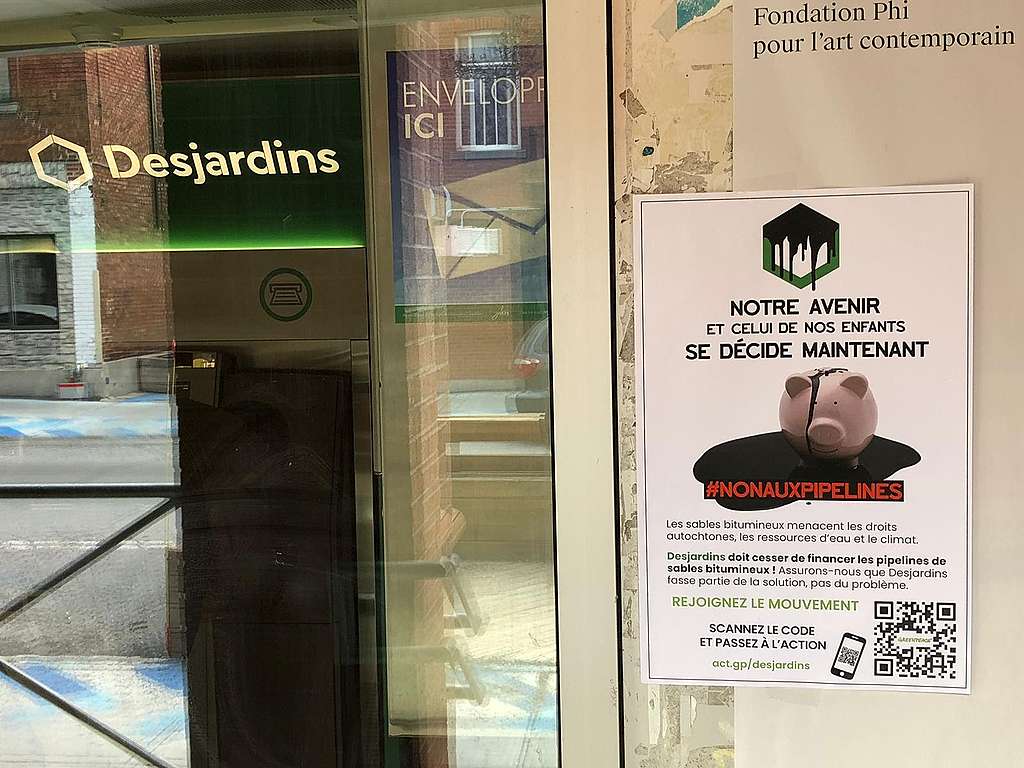
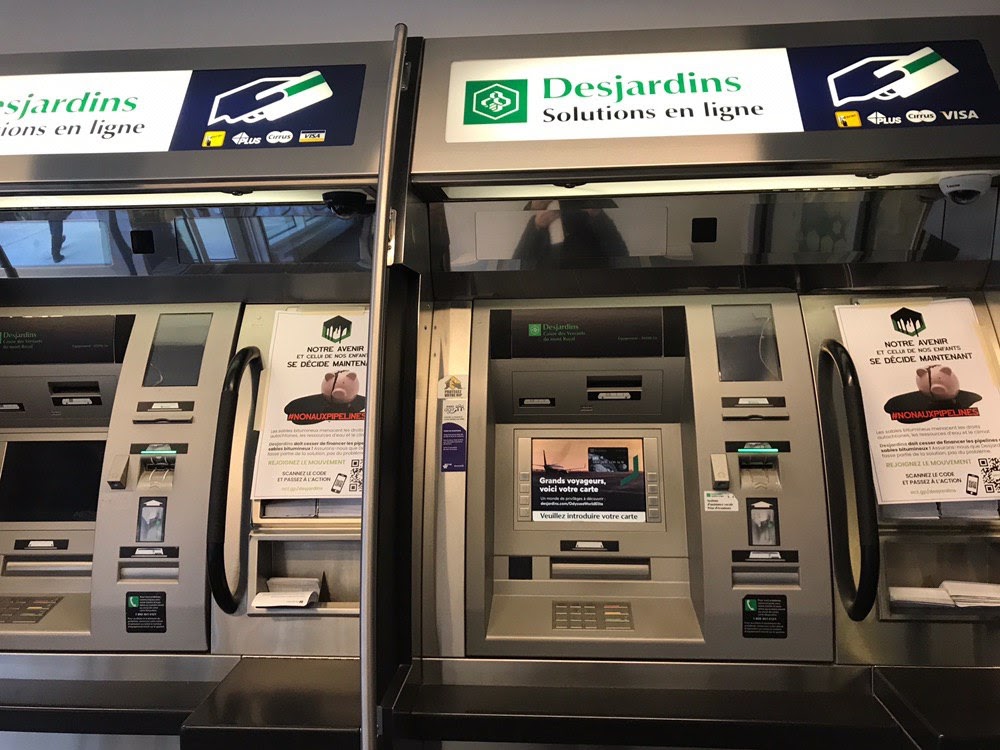
Speaking out at Annual General Meetings
In March 2018, we worked with community groups to organize a demonstration outside Desjardins’ Annual General Meeting (AGM) to remind the 1,000 or so leaders present that it is imperative to stop funding oil sands pipelines such as Trans Mountain. Our presence was even mentioned by those inside the AGM, who insisted that such demands be taken into consideration.
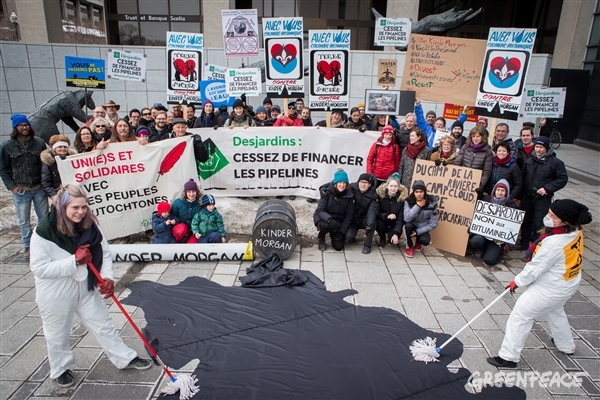
Then came the annual general meetings of the dozens of individual credit unions (or ‘caisses populaires’ as they are called in Quebec) that make up Desjardins. We helped members submit resolutions calling for an end to all financing and investment in tar sands pipelines. We used the democratic mechanisms of the financial institution to make sure these demands would have greater legitimacy when presented to upper management because they had been voted on by the membership. And these efforts paid off!
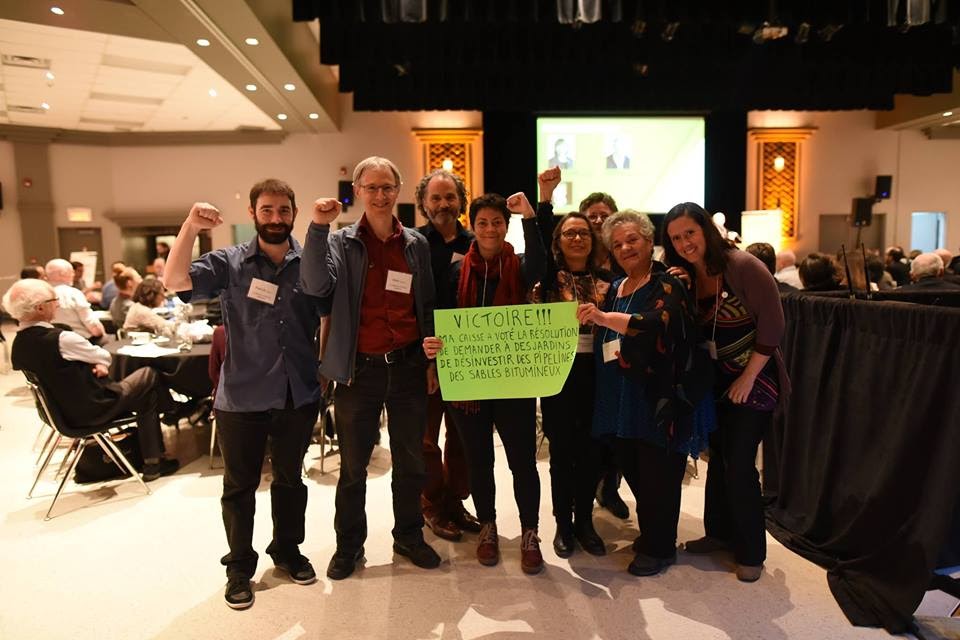
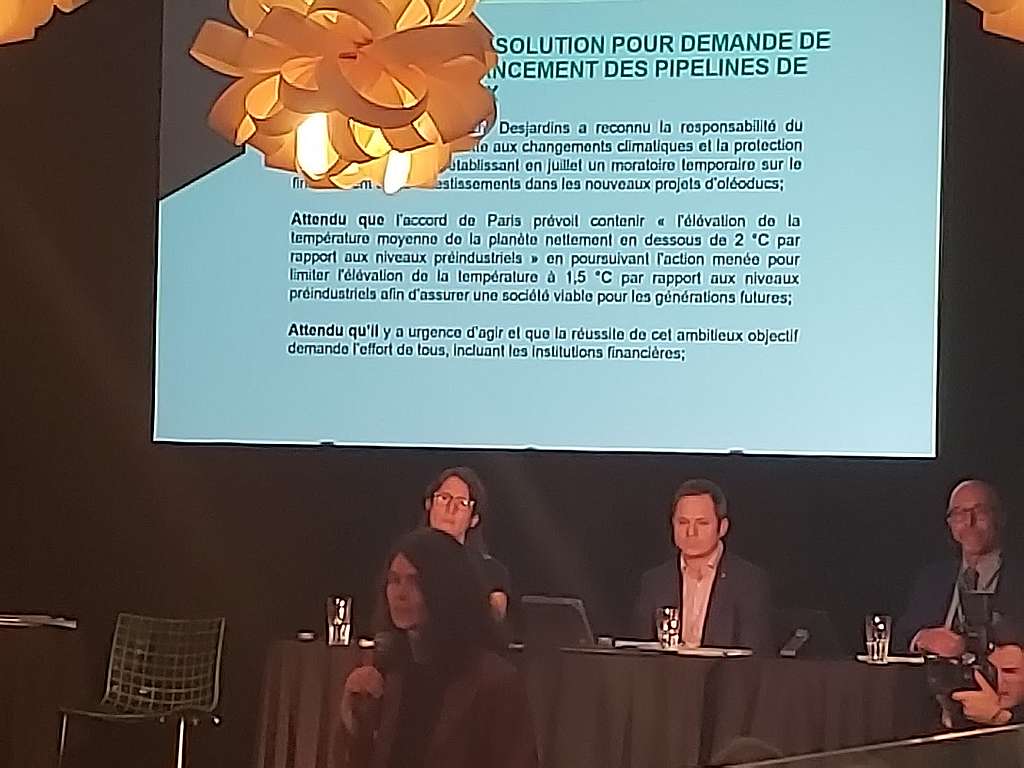
Thanks to this mobilization, 37 credit unions representing over 700,000 members adopted the resolutions. This action made the front page of Le Devoir, one of Quebec’s leading newspapers, much to the embarrassment of Guy Cormier, President and CEO of the Desjardins Group!

However, Desjardins still refused to budge, so we decided to challenge its top executives in various public places. For instance when Mr. Cormier made a speech at the Montreal Council on Foreign Relations, we called him out on the microphone and deployed a banner in front of more than 350 business leaders and Desjardins employees.

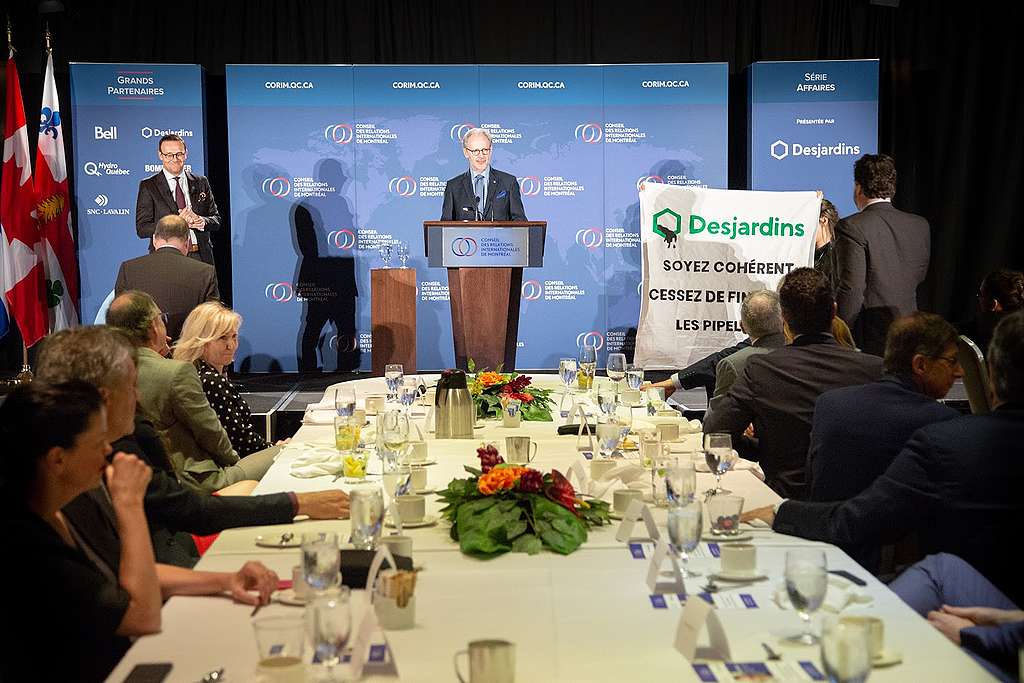
When Mr. Cormier made a presentation to MBA students at the HEC business school, members of the Greenpeace Montreal local group came forward to remind him that his inconsistency on climate change was unacceptable.
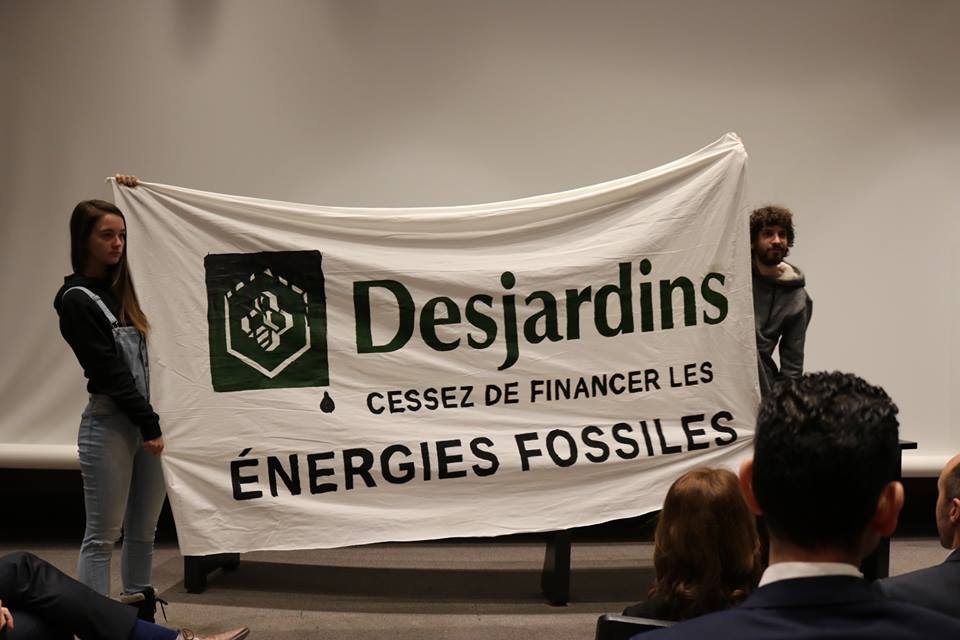
As the pressure continued to mount and major international institutions withdrew their funding from fossil fuels, we did not let up the pressure on Desjardins, as shown in this video from our local groups.
In March 2019, more than 300 high school youth went on strike for the climate and demonstrated in the streets of Montreal. Their march ended in front of the Convention Centre, where the first day of the Desjardins AGM was being held. The students asked Desjardins to divest from fossil fuels.

The next day, despite the freezing rain, various groups gathered outside, in the hopes of being seen and heard by Desjardins leaders. These included Greenpeace, La Planète s’invite au Parlement (LPSP), La Planète s’invites à l’Université (LPSU) and Extinction Rebellion.
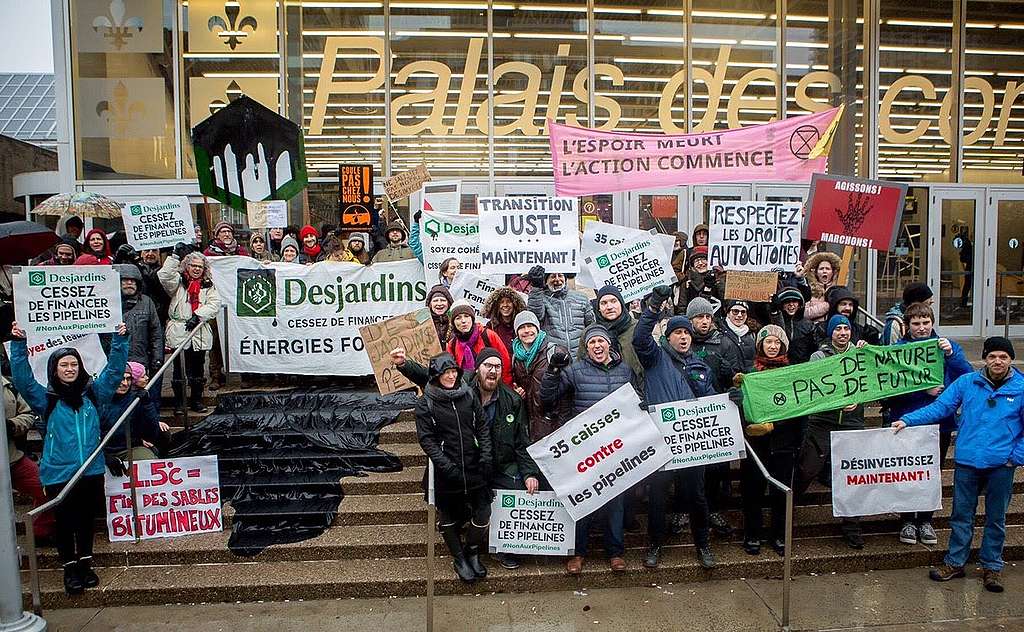
At the same time Greenpeace activists and Desjardins members entered the premises to distribute hundreds of satirical leaflets bearing the Desjardins logo, which explained to credit union leaders the urgency of the climate crisis and the need to stop financing pipelines, oil sands, and the climate crisis generally.


Our continuous efforts paid off!
On June 5, 2020, we received some good news. The Desjardins Group announced that its 17 SocieTerra funds and portfolios had become 100% fossil-free. The exposure of these investment products to fossil fuel producers and carriers has therefore fallen from 5% to 0%.
It’s an important milestone in our quest for a first, entirely fossil-free, major Canadian bank.
This victory would not have been possible without your participation, and without the efforts of allies, including those Desjardins members and employees who have been pushing for years for a divestment from fossil fuels.
The links that the banking sector has with the fossil fuel industry, particularly the oil sands, are leading us in the wrong direction. However, we are at a turning point for climate action, and we know that investments made today are shaping the energy system of tomorrow. Financial institutions have a key role to play in implementing a green and just recovery.
Instead of maintaining business ties with companies such as TransCanada and Enbridge—which are trying to build the Keystone XL, Line 3 and Coastal Gaslink pipelines—Desjardins could stand out by becoming the first major Canadian banking institution to respect the Paris Agreement and completely divest from climate-damaging projects.
Several financial institutions, such as ING, BNP Paribas, HSBC, Natixis and Crédit Agricole have already adopted policies limiting or excluding funding for oil sands projects.
More recently, in May 2020, Norway’s sovereign wealth fund—the world’s largest with nearly $1.5 trillion in assets—blacklisted 12 new companies, including four major Canadian tar sands companies.
The European Investment Bank announced that it will no longer finance fossil fuel projects from the end of 2021, and that it is committed to putting in place the most ambitious climate investment strategy of all public financial institutions.
We will not stop there!
The greening of the SocieTerra funds and portfolios is a great step forward, but Desjardins can and must go even further! We invite you to write an email to the management of your Desjardins credit union, especially if you are a Desjardins member. Congratulate them on this announcement and invite them to completely divest from fossil fuels. If you need our support, please write to [email protected].
Thanks for everything you do!
